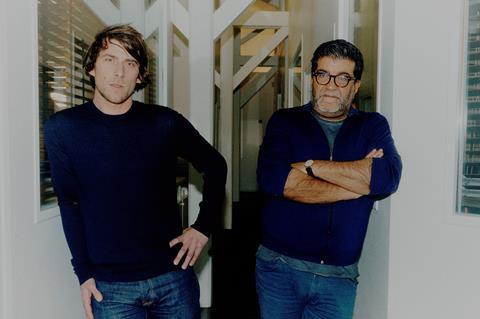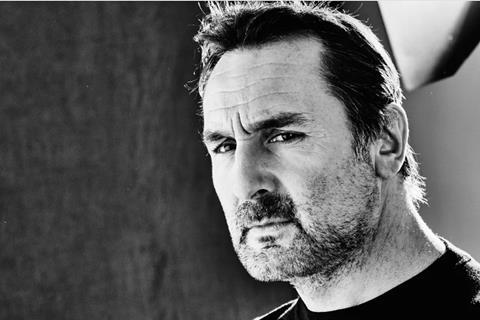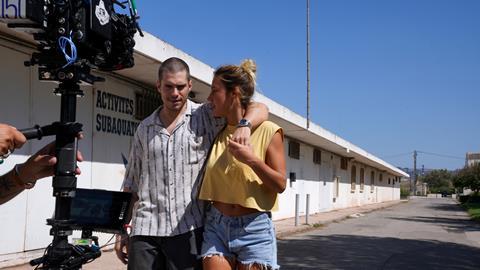At €32m, Gilles Lellouche’s Beating Hearts is Studiocanal’s biggest budget French production to date.
Premiering tonight (May 23) in Cannes Competition, the film reteams Studiocanal with actor/filmmaker Gilles Lellouche and producers Alain Attal of Trésor Films and Hugo Selignac of Chi-Fou-Mi after 2018’s Sink Or Swim (also directed by Lellouche) and last year’s All Your Faces.
Both of those previous collaborations were well-received in France, with the former selling 4.3 million tickets at cinemas while the latter sold 1.2 million tickets and also scored nine Cesar nominations including best film. Studiocanal will be hoping its investment in Beating Hearts pays similar dividends when the film is released locally on October 16.
The film’s French title is L’Amour Ouf which loosely translates to “crazy love”, an apt description of what has been a passion project 18 years in the making for Lellouche, Attal and Selignac.
Based on Neville Thompson’s Irish novel Jackie Loves Johnser OK?, the time-hopping tale follows a pair of star-crossed lovers who meet in the 1980s as teenagers and fall madly in love even as life does its best to keep them apart. “It has been a shared adventure from the start,” Attal tells Screen.

The producers first joined forces with Lellouche for his 2004 debut feature Narco, co-directed with Tristan Aurouet, when Selignac was a production assistant at Trésor (he left in 2010 to set up Chi-Fou-Mi).
A couple of years later, in 2006, actor Benoit Poelvoorde shared Thompson’s novel, first published in 1997, with Lellouche. As the actor/filmmaker recounts to Screen, “I fell wildly in love with this book,” and he showed it to his Narco producers.
Attal subsequently bought the rights and Lellouche worked on an adaptation that transposed the story to northern France for four years before finally giving up on it.
“I knew it was too ambitious for me to direct on my own and no one would finance it, so I let the project go,” says Lellouche.
Back on track
Turning his focus back to his acting career, the prolific French star has appeared in more than 50 films since 2003 alone, including Tell No One and Little White Lies for Guillaume Canet and Smoking Causes Coughing and Daaaaali! for Quentin Dupieux.
Then came Lellouche’s first solo directing effort Sink Or Swim which Selignac and Attal say was a strategic step towards being able to make Beating Hearts. The comedy about a male synchronised swimming team starred Mathieu Amalric, Canet and Poelvoorde, and premiered out of Competition at Cannes.
“We made a more audience-friendly film and said that if it is successful, that will give us the means to make the film we want,” Attal says.
Off the back of Sink Or Swim, the producers were able to secure the €32m ($34.7m) budget they wanted to make Beating Hearts – a hefty price tag for the French market but as soon as Studiocanal jumped on board, “others followed”, says Selignac.
The project’s co-producers include France 2 Cinema, Cool Industrie, Artémis Productions, VOO and BeTv, and Proximus, with further backing from Canal+, Netflix, France Televisions and RTBF. Studiocanal handles international sales.

Beating Hearts was atypical on paper. “It is several genres at once – a gangster film, a love story, a movie about memories. It’s a love story filled with violence that flirts with the musical genre,” says Lellouche, whose co-writers on the script he went into production with were Audrey Diwan and Ahmed Hamidi (also a co-writer on Sink Or Swim).
Selignac adds: “Epic romance is a genre we don’t often do in France.”
The film’s A-list cast includes Adèle Exarchopoulos and François Civil, who play the central lovers as adults; newcomers Mallory Wanecque and Malik Frikah, who portray them in their teenage years; and Poelvoorde, Alain Chabat and Elodie Bouchez.
The film’s soundtrack blends pop and rock tracks from the likes of Prince, Deep Purple, Foreigner, Lil Kim, The Cure and Billy Idol with an original score by American composer Jon Brion, whose previous credits include Punch-Drunk Love and Greta Gerwig’s Lady Bird. It also includes musical dance interludes from Marseille-based troupe La Horde.
“The music adds emotional power. It makes the film bigger, more universal and more ambitious, even if it is expensive,” Selignac says, adding that he sees the film in the vein of “an ultra-ambitious American film by Quentin Tarantino, Martin Scorsese or Paul Thomas Anderson”.
For Lellouche, the biggest challenge was “mixing so many genres and seeing if together they would make for a cocktail that was digestible.
“I had scenes of how the film would look in my head for 18 years, but one should never trust one’s own mind,” he adds.
Beating Hearts filmed over 18 weeks in northern France last summer – and the filmmaking partners say they’re glad in hindsight the project took nearly two decades to come to fruition.
“The film matured and so did Gilles as a director,” Attal says, “while we have also amassed experience as producers.”
Had he made the film 18 years ago, as well as having less financial and artistic freedom Lellouche observes, “I would have made a story more loyal to the book than loyal to myself.
“I made a film about a story that is not my own, but it is so personal,” he adds. “I made the film I want to see.”






![The Brightest SunScreen[Courtesy HKIFF]](https://d1nslcd7m2225b.cloudfront.net/Pictures/274x183/3/5/0/1448350_thebrightestsunscreencourtesyhkiff_312678.jpg)



















No comments yet